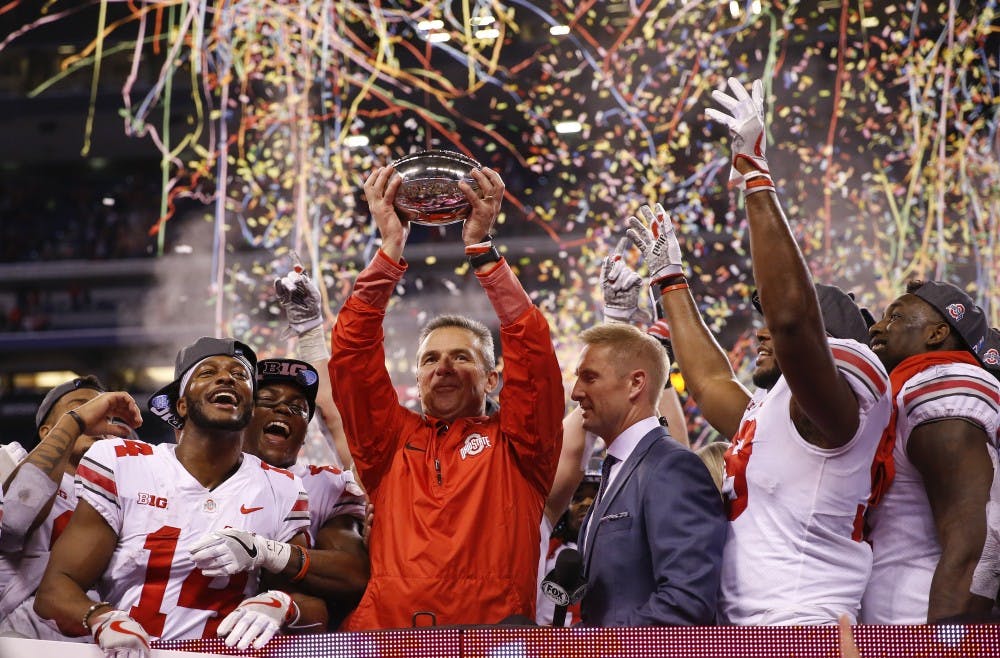Ohio State University head football coach Urban Meyer sat stoically as school president Michael V. Drake announced his three game suspension in wake of an investigation into his handling of the domestic abuse scandal involving former-wide receiver coach Zach Smith.
Following remarks from both Drake and athletic director Gene Smith, Meyer delivered a prepared statement. He remarked on, “how challenging this was for our community,” and that he “wanted to apologize to Buckeye nation.”
Over the course of almost 20 minutes of questioning, Meyer apologized to Courtney Smith, the alleged victim of Zach Smith’s abuse, a grand total of zero times.
In analyzing Meyer’s placid apology, the scene drew vibes eerily reminiscent of former head coach Jim Tressel’s bluntly indifferent address in the midst “Tattoo-gate.”
"I don't think less of myself at this moment," Tressel said in March 2011 when questioned about how the scandal would affect his reputation.
Retrospectively, neither coach adequately discussed their misdeeds. But as it relates to Meyer, to characterize his purported disregard for someone in distress and Ohio State’s callous response as deplorable is almost too light a word. Frankly, it’s appalling.
In the circumstances of Tressel’s run-in with Ohio State administrators and the NCAA, the nail in his proverbial coffin was that he lied. The former head coach denied knowing some of his players had received improper benefits from a local tattoo parlor. He was subsequently caught in his fib and lost his job on account of it.
As for Meyer, he was similarly conniving in his handling of the Zach Smith saga. At Big Ten media day on July 24, one day after reporter Brett McMurphy released his initial findings on the case and just hours after Smith was fired as a result, he vehemently and falsely denied any knowledge of a 2015 controversy involving Smith and the Powell, Ohio police.
“Once again, there’s nothing – once again, I don’t know who creates a story like that,” Meyer said.
Mary Jo White, one of the university’s lead investigators, characterized these comments in a less than reassuring way.
“While those denials were plainly not accurate, Coach Meyer did not, in our view, deliberately lie,” White said last week.
Translation: Meyer lied about whether he knew of the 2015 investigation into Smith, but Ohio State determined he did not tell this lie on purpose. Therefore, it was an acceptable response.
Wait, what?
It gets better.
“We also learned during the investigation that Coach Meyer has sometimes had significant memory issues in other situations where he had prior extensive knowledge of events,” the report stated. “He has also periodically taken medicine that can negatively impair his memory, concentration, and focus.”
Yes, you read that correctly – the justification for Meyer’s not-deliberate lie is because he sometimes forgets things he used to have extensive knowledge of and he takes medicine that affects his ability to remember.
Though I have my doubts, I’m not a doctor so I won’t attack the issue of Meyer’s medication. However, the premise that a college football coach at Meyer’s level not knowing know what’s ensuing within his program is laughable.
I recently spoke with one college staffer who has been a head coach since the late 1970s about knowing where his team generally stands day-to-day. His response was nothing short of candid.
“I know where we stand every damn day,” he said. “I know every position. I know every summer school class. We are on top of it.”
Further, Meyer had discussed with Ohio State chief of football operations Brian Voltolini if there was a way to delete messages older than a year off his phone – an action investigators determined, “Often, although not always, such reactions evidence consciousness of guilt.”
Differently put – those conducting the probe clearly verbalized that someone trying to delete old messages days after a damning report regarding said person is often an indicator of guilt. Yet Meyer got off the hook.
Even more reprehensible is that the investigation found Courtney Smith had sent pictures of her bruised body to Meyer’s wife, Shelley – though whether he knew of these images was unclear.
Investigators did find that Meyer arranged counseling for the Smith’s in wake of the 2015 disturbances. But when a spouse has been beaten to a pulp, talking about one’s feelings seems like a rather apathetic way of helping.
In Tressel’s case, he was forced to resign because he lied about his players getting free tattoos. He broke the rules, misled investigators and got burned for it.
Meyer accomplished virtually the same thing, except his context is that he failed to report rampant domestic abuse claims against one of his assistant coaches and blatantly lied to the media about his knowledge of these events. The difference: he kept his job.
I’m no math whiz, but that equation certainly does not add up.
Firmly entrenched in the era of #MeToo, domestic abuse and violence against women have shifted to the forefront of public forum. Ohio State had a chance to stand in solidarity with those victims.
Instead, university investigators echoed both Tressel and Meyer’s impassive reactions, albeit Tressel’s issues were overtly less lamentable. They alleviated any doubt that at Ohio State winning football games trumps common decency – even when a woman’s life hangs in the balance.






